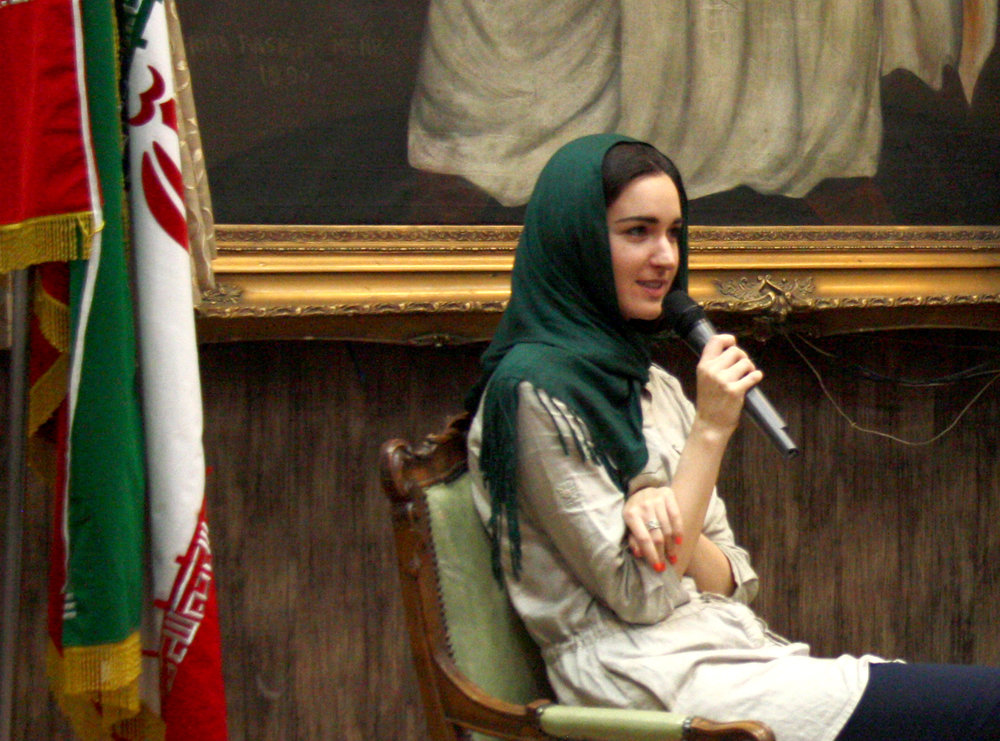Iranian women do not give up easily: Tech girl Roxanne Varza

Iranian women don’t give up easily and this is something that has impressed me very much, said Roxanne Varza, the 31-year-old girl who was placed by Business Insider at 6th place among the top 30 women under 30 in tech in 2013.
By Naghmeh Mizanian
Varza, born to an Iranian family in the U.S., is trilingual and holds degrees from UCLA, Sciences Po Paris and the London School of Economics. She is also an epilepsy advocate.
Varza is the co-organizer of the Failcon Paris conference. More recently, she co-founded Tech.eu, a European tech media.
Prior to TechCrunch, Varza worked for the French government’s foreign direct investment agency helping fast-growing startups develop their activities in France. Roxanne has spoken, moderated, mentored and judged numerous startup events and programs throughout Europe and also helps European startups with content and communications.
“Iranian women have a very good spirit. I love it. I have heard a lot about difficulties and challenges that they have but still they have a very strong spirit,” Varza said in an interview with the Tehran Times.
“This was a funny feeling when I came to know that I am among the top thirties. I think it is always very nice to be on this list but I definitely think that there are so many women around the world that should be recognized”, she explained.
“Technology is both for men and women. When we started Girls in Tech, we were two people. I was a journalist at the time and I was writing about technology startups and all the startups that I met were founded by men and I was looking for some new stories. So we started this group to see who are the women working in technology and we actually discovered that they are a lot but they don’t go to other technology events,” Varza said, who was the former editor of TechCrunch France (2010-2011).
So, this was the main reason that we started Girls in Tech and today we do a lot of different programs to help encourage more women to join technology, she said, adding the number of women in technology is very low, usually around 30% in western Europe and the U.S..
I know Iran’s statistics is actually much better, she noted.
“For girls that want to work on startups, I usually say you should start your own project. It doesn’t have to be your own start-up, but a startup project,” Varza, the director of the Halle Freyssinet, 1000 Startups project, which is set to be the largest startup incubator worldwide said.
I did the same thing when I started my blog or when I started Girls in Tech, explained Varza, the co-founder of the French and British chapters of Girls in Tech.
Startup is not specific to women, but definitely I have been very excited about getting more women into technology and encouraging especially younger generations to come into technology, she noted.
For me beginning to work in startups was by accident. I worked for a French government agency, working with American startups to bring them to France. So I tried to open offices for facebook, twitter, and other companies in France and that was when I discovered actually I love startups, Varza said.
I love people who are creative, very optimistic and very intelligent. So I love entrepreneurs and that is how I got involved in startups. The second step I took was when I started a blog and my blog let me meet a lot of people, go to lots of events, and develop my network.
The talent of women in technology is actually very good. When people ask me what is the difference between a man and woman, I always say I don’t know. I haven’t been a man! But I think when we are looking at the talent, it is exactly the same. Women are actually matching men in everything, she stressed.
I think it is a very good time to be a woman entrepreneur right now, noted Varza. I always think even though women’s percentage in technology is very low, it’s an advantage. Having been somebody who is rare is definitely something that people remember and people notice, which actually helps businesses a lot and the second thing is right now we are seeing a lot of big corporations, Microsoft, Google, IBM, all big companies that want to work more with women, she explained.
I think they are looking at being in diverse profiles. They don’t want to hire a ton of people with the same background, because that’s not where innovation comes from. So I think that they are realizing that they need women, said Varza, who was the lead for Microsoft’s startup activities in France, running both Bizspark and Microsoft Ventures programs for 3 years.
There is no reason that a woman should be paid less than a man in any job, she stressed. There are different campaigns in France to make equal salaries for men and women.
Varza who prefers to come to Iran than going to the U.S., travels to Iran at least once a year, this time to meet her old grandmother, Tooran Shahriyari, who is one of the first female Iranian lawyers and also a poet living in Tehran.
I think Iran is also in a very exciting time because its economy and market is very attractive for foreigners, Varza noted, adding, foreigners want to learn about Iran and they want to be connected with Iran; and I think Iran is a very good place for investment right now.
